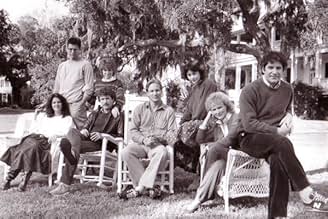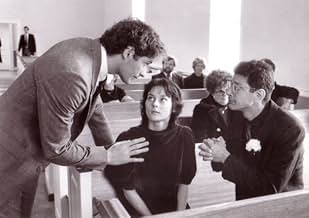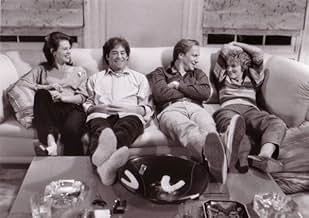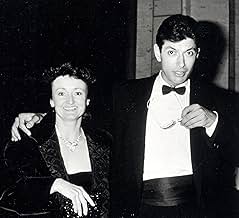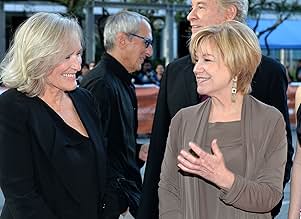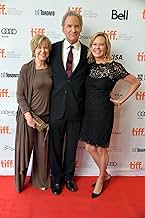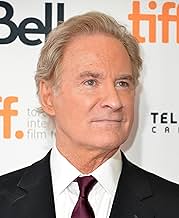A group of seven former college friends gather for a weekend reunion at a South Carolina vacation home after the funeral of another of their college friends.A group of seven former college friends gather for a weekend reunion at a South Carolina vacation home after the funeral of another of their college friends.A group of seven former college friends gather for a weekend reunion at a South Carolina vacation home after the funeral of another of their college friends.
- Director
- Writers
- Stars
- Nominated for 3 Oscars
- 3 wins & 8 nominations total
Jonathan Kasdan
- Harold and Sarah's Son
- (as Jon Kasdan)
Jake Kasdan
- Autograph Seeker
- (as Jacob Kasdan)
- Director
- Writers
- All cast & crew
- Production, box office & more at IMDbPro
Featured reviews
When I was a student at Cambridge in the early eighties, shortly before "The Big Chill" came out, a friend of mine had a poster on his wall entitled "Woodstock Tenth Anniversary Reunion". (The actual anniversary had taken place in August 1979, not long before we went up). The joke was that those attending the reunion were all middle-class professional types, smartly dressed in lounge suits with well-trimmed short hair. This poster exemplified the way in which my generation saw the baby boomers, twentysomething hippies turned thirtysomething yuppies. Those who still retained their hippie idealism were mercilessly derided as being at least ten years behind the times. (And derided not only by Cambridge students but also by the likes of B. A. Robertson, in his satirical song "Kool in the Kaftan").
"The Big Chill" takes a rather more charitable look at the problems facing those idealists from the 1960s who tried to retain their idealism during the conservative Reagan years of the early 1980s. It features a group of old college friends from the University of Michigan who are reunited after fifteen years. The event which reunites them is the death of Alex, one of the group, who committed suicide while staying at the home of his friends Harold and Sarah. An impromptu reunion occurs as the old friends gather for Alex's funeral.
The precise reasons why Alex killed himself are not spelled out- he did not leave a suicide note- but as the movie progresses we realise that he had become disillusioned with the course his life had taken. (He was a brilliant scientist, but had dropped out of the academic life to become a social worker). His friends also come to realise this, and the realisation prompts them to consider the paths their own lives have taken. Most of the group were involved in the counterculture of the 1960s and the peace movement or other forms of radical politics, but most are now living much more conservative, middle-class lifestyles. Harold is a business executive and his wife Sarah a doctor; they live in an elegant antebellum home in the South. Sam, a one-time radical, has now become a Hollywood actor closely based upon Tom Selleck, down to the moustache. (While watching the film I assumed that Selleck himself was playing the part; it was only when I saw the cast-list that I realised it was actually Tom Berenger). Karen is also now living an affluent lifestyle but is feeling dissatisfied with her husband Richard (who was not one of the college group). Michael, once a radical journalist, now works for the apolitical, celebrity-obsessed "People Magazine". Nick, a Vietnam War veteran, has now become a drug dealer. Apart from their friend's suicide, the question which haunts the group is what became of their youthful idealism?
Contrary to what one might have expected, the film does not take a straightforward "radicalism good, conservatism bad" line. A key scene comes when Nick nearly gets himself arrested by badmouthing the local policeman. Harold, a personal friend of the officer, manages to smooth things out, but then berates Nick for his rudeness and stupidity. To Nick, who still subscribes to the sixties idea that all cops are "pigs" , this may seem like a sellout to the enemy, but I suspect that most of the audience will side with Harold who realises that some of his contemporaries have difficulty in distinguishing between idealism and childishness.
"The Big Chill" has something in common with another movie from the early eighties, Barry Levinson's "Diner" from 1981, which also deals with a reunion of a group of former classmates, although that film is a period piece set in 1959 and the characters are rather younger, being in their twenties rather than their thirties. What the two films have in common is that both are excellent examples of ensemble acting.
This was the second film of its director Lawrence Kasdan (his first was the very different neo-noir thriller "Body Heat") and it starred a number of actors, such as William Hurt and Kevin Kline, who were to become regulars in Kasdan's movies. , (Kevin Costner, originally cast as Alex, was edited out of the final version, but also went on to become a Kasdan regular). There are too may good performances to list them all, but special mentions must go to Kline as Harold, Glenn Close as Sarah and Meg Tilly as Alex's strange, unworldly younger girlfriend Chloe.
One question much discussed on this board is whether the film is "dated". Leaving aside trivial questions of fashion (even in the eighties Tom Berenger's hairstyle must have looked very seventies), I think that it is "dated", but only in the narrow, limited sense that it deals with cultural phenomena such as the sixties counterculture which were very much of their own era. In a wider sense it is not dated because it deals with timeless issues such as love, friendship and the challenge of staying true to one's youthful ideals in later life. (Another eighties film on this theme, although in my view a less successful one, is Fred Schepisi's "Plenty").
I felt that the film was occasionally slow-moving, with too great an emphasis on talk over action. I also wondered whether it might not have been improved by keeping Costner's scenes to allow us to see what sort of a person Alex was and why his death had such a traumatic impact on his friends. Overall, however, I felt that it was a very watchable film, and often a moving one- one that could be watched for pleasure not only by those who are too young to remember the sixties but even those who are too young to remember the eighties. 7/10
"The Big Chill" takes a rather more charitable look at the problems facing those idealists from the 1960s who tried to retain their idealism during the conservative Reagan years of the early 1980s. It features a group of old college friends from the University of Michigan who are reunited after fifteen years. The event which reunites them is the death of Alex, one of the group, who committed suicide while staying at the home of his friends Harold and Sarah. An impromptu reunion occurs as the old friends gather for Alex's funeral.
The precise reasons why Alex killed himself are not spelled out- he did not leave a suicide note- but as the movie progresses we realise that he had become disillusioned with the course his life had taken. (He was a brilliant scientist, but had dropped out of the academic life to become a social worker). His friends also come to realise this, and the realisation prompts them to consider the paths their own lives have taken. Most of the group were involved in the counterculture of the 1960s and the peace movement or other forms of radical politics, but most are now living much more conservative, middle-class lifestyles. Harold is a business executive and his wife Sarah a doctor; they live in an elegant antebellum home in the South. Sam, a one-time radical, has now become a Hollywood actor closely based upon Tom Selleck, down to the moustache. (While watching the film I assumed that Selleck himself was playing the part; it was only when I saw the cast-list that I realised it was actually Tom Berenger). Karen is also now living an affluent lifestyle but is feeling dissatisfied with her husband Richard (who was not one of the college group). Michael, once a radical journalist, now works for the apolitical, celebrity-obsessed "People Magazine". Nick, a Vietnam War veteran, has now become a drug dealer. Apart from their friend's suicide, the question which haunts the group is what became of their youthful idealism?
Contrary to what one might have expected, the film does not take a straightforward "radicalism good, conservatism bad" line. A key scene comes when Nick nearly gets himself arrested by badmouthing the local policeman. Harold, a personal friend of the officer, manages to smooth things out, but then berates Nick for his rudeness and stupidity. To Nick, who still subscribes to the sixties idea that all cops are "pigs" , this may seem like a sellout to the enemy, but I suspect that most of the audience will side with Harold who realises that some of his contemporaries have difficulty in distinguishing between idealism and childishness.
"The Big Chill" has something in common with another movie from the early eighties, Barry Levinson's "Diner" from 1981, which also deals with a reunion of a group of former classmates, although that film is a period piece set in 1959 and the characters are rather younger, being in their twenties rather than their thirties. What the two films have in common is that both are excellent examples of ensemble acting.
This was the second film of its director Lawrence Kasdan (his first was the very different neo-noir thriller "Body Heat") and it starred a number of actors, such as William Hurt and Kevin Kline, who were to become regulars in Kasdan's movies. , (Kevin Costner, originally cast as Alex, was edited out of the final version, but also went on to become a Kasdan regular). There are too may good performances to list them all, but special mentions must go to Kline as Harold, Glenn Close as Sarah and Meg Tilly as Alex's strange, unworldly younger girlfriend Chloe.
One question much discussed on this board is whether the film is "dated". Leaving aside trivial questions of fashion (even in the eighties Tom Berenger's hairstyle must have looked very seventies), I think that it is "dated", but only in the narrow, limited sense that it deals with cultural phenomena such as the sixties counterculture which were very much of their own era. In a wider sense it is not dated because it deals with timeless issues such as love, friendship and the challenge of staying true to one's youthful ideals in later life. (Another eighties film on this theme, although in my view a less successful one, is Fred Schepisi's "Plenty").
I felt that the film was occasionally slow-moving, with too great an emphasis on talk over action. I also wondered whether it might not have been improved by keeping Costner's scenes to allow us to see what sort of a person Alex was and why his death had such a traumatic impact on his friends. Overall, however, I felt that it was a very watchable film, and often a moving one- one that could be watched for pleasure not only by those who are too young to remember the sixties but even those who are too young to remember the eighties. 7/10
1983's THE BIG CHILL is one of those beautifully crafted and wonderfully acted films that is so ingratiating that I can watch it over and over and never tire of it. Director Lawrence Kasdan hits the bullseye in this alternately hilarious and moving variation on the earlier RETURN OF THE SECAUCUS SEVEN. This film follows the reunion of a group of friends who went to college together, who have gathered for the funeral of their mutual friend, Alex, who has committed suicide. The original screenplay included scenes with Alex, who was played by Kevin Costner, but, in a stroke of genius, it was decide to delete all of the Alex scenes in the film, lending a wonderful air of mystery to the character of Alex and allowing the audience more input as to why Alex decided to end his life. Alex's friends are Harold Cooper (Kevin Kline), who now owns a shoe store franchise and his doctor-wife, Sarah (Glenn Close), who also serve as our hosts ; Michael (Jeff Goldblum), a writer for PEOPLE magazine; Meg (Mary Kay Place)an attorney who wants to have a baby; Sam (Tom Berenger) an actor with his own TV show who misses the simple life; Karen (JoBeth Williams), a restless housewife who would really like to be a writer and Nick (William Hurt) a drug dealer who would like to be anything else. Also thrown into the mix is Chloe (Meg Tilly) Alex's girlfriend, who knows a completely different Alex than his friends do. This gathering of old and new friends sets the stage for some long-dormant resentments to bubble to the surface and for some long buried passions to be re-ignited. Kasdan has a sharp directorial eye and a flawless ear for dialogue with one of the most quotable screenplays ever and it is all set to a soundtrack of the greatest music from the 1960's ever compiled for a movie soundtrack. The cast is perfection...Close received a Best Supporting Actress nomination but the entire cast works at the same level and to honor one without honoring the ensemble wouldn't have been right. This is the ultimate ensemble piece and it works just about perfectly. Anyway you slice it, an instant classic.
There was something about this movie which I couldn't place my finger on. Although I barely made the 60's, of which all the characters are reminiscing of and therefore perhaps I maybe missed some subtle messages or didn't get some in-jokes about the 60's, this movie still applies to everyone. I guarantee every generation will have a time where they come back after 10 or 15 years and see friends that had been so important but are now barely on the radar. They will have a weekend of drinking and tears and fights and laughter. You will look at someone and remember a deep, hidden passion for them that you felt so long ago and never shared with anyone.
That is of course, the plot of the movie.
7 friends (who go wayyy back) one husband (who disappears pretty quickly) and a widowed girlfriend (who is barely known by anyone) come together after they learn that Alex, a friend formally part of the clique, had committed suicide (this part was infamously played by Kevin Costner). They have a weekend of sex, drugs, and good ol' fashioned rock and roll, the whole time bringing up past ghosts that had seemed long forgotten and faded. This is touchy subject, even in today's standards. Yet the movie handles it beautifully. My favourite section in the whole movie was when `You can't always get what you want' was played at his funeral. Not for the song, although it is a classic but for how the characters react. Each sit there in the church, some smiling quietly to themselves, while others have a sadden expression, remembering great times that were and never will be again. Every person has a song like that, one that makes you remember your friends, one that makes you sad or laugh and or grin to yourself as you remember the things you did. That to me clinches the movie. It shows how true the script is, and how humanly the characters react. There is a lot of angry hype about the movie, how there is too much talking and not enough sex or car chases or whatever people think is missing. Yet for me, it is reality. When something like this happens in real life, people do not over dramatise. Life is not a soap opera, although movie-goers seemed to want this movie to be. In a real-life situation, people would do exactly what the characters did, examine themselves and try to find a reason for the problems that have happened. Yet the hard truth is, especially about suicide, sometimes, there is no one you can blame. I think people didn't like this movie too much because it rang too true. It was too realistic. People go the movies to be entertained, to fall in love with the fairy-tales lives that movies have. This movie is honest. It seems, for now, people just want to be naïve and live in a fantasy world. If you want a true movie, see this one now.
That is of course, the plot of the movie.
7 friends (who go wayyy back) one husband (who disappears pretty quickly) and a widowed girlfriend (who is barely known by anyone) come together after they learn that Alex, a friend formally part of the clique, had committed suicide (this part was infamously played by Kevin Costner). They have a weekend of sex, drugs, and good ol' fashioned rock and roll, the whole time bringing up past ghosts that had seemed long forgotten and faded. This is touchy subject, even in today's standards. Yet the movie handles it beautifully. My favourite section in the whole movie was when `You can't always get what you want' was played at his funeral. Not for the song, although it is a classic but for how the characters react. Each sit there in the church, some smiling quietly to themselves, while others have a sadden expression, remembering great times that were and never will be again. Every person has a song like that, one that makes you remember your friends, one that makes you sad or laugh and or grin to yourself as you remember the things you did. That to me clinches the movie. It shows how true the script is, and how humanly the characters react. There is a lot of angry hype about the movie, how there is too much talking and not enough sex or car chases or whatever people think is missing. Yet for me, it is reality. When something like this happens in real life, people do not over dramatise. Life is not a soap opera, although movie-goers seemed to want this movie to be. In a real-life situation, people would do exactly what the characters did, examine themselves and try to find a reason for the problems that have happened. Yet the hard truth is, especially about suicide, sometimes, there is no one you can blame. I think people didn't like this movie too much because it rang too true. It was too realistic. People go the movies to be entertained, to fall in love with the fairy-tales lives that movies have. This movie is honest. It seems, for now, people just want to be naïve and live in a fantasy world. If you want a true movie, see this one now.
As a member of Gen-X having just revisited this movie after several years, I have to say that the soundtrack took me down "memory lane" in a big way, and may be one of the best things about The Big Chill. My generation's experience with this music is very different than that of my parents', having been force-fed Three Dog Night, The Band, and all the rest as a young child. It remains a part of my psyche, buried deep in the most obscure and remote of my memories. It was fantastic to hear those songs again, in spite of how much my taste in music has changed over the years. A classic is a classic, and the soundtrack is LOADED with them. Music can make or break a movie, and in The Big Chill, the music is an integral part of the film, as important as the cast, the writing and the directing. Its hard to imagine different music, just as it's hard to imagine a different cast. The songs weave in and out of the movie as easily and naturally as the subplots weave in and out of the story.
22 years after being dragged to this movie by my parents (who LOVED it), I remain pleasantly surprised at what a good movie it is as a whole, and how much more I liked it as an adult. The acting is brilliant. The writing is excellent. The directing is fantastic. Everything snaps into place in ways that keep you from getting bored, irritated, or otherwise turned off. Sometimes melodramatic, sometimes hilarious, the characters are well-constructed by the writer(s) and beautifully brought to life by the cast. Two hours fly by without dragging, down time, misfires or backfires. The story unfolds in 1983 with a crew of Baby Boomers, college friends brought back together by tragedy, taking stock in their lives as they get reacquainted with each other after many years have passed. The story may be dated, but anyone, no matter their "generation," can find something to relate to in this film. The interpersonal relationships, the individual journeys, and the self-reckoning that comes with the death of a friend... all of us can grasp these concepts and drink them in, get lost in them, feel the pain, and feel the joy. We can relate to it because its themes are timeless... love, loss, sadness, joy, growing up and getting older. This happens to us all.
My only real criticism of this picture would be that once in a while the film was a little too poignant and too depressing for my tastes, but only for brief moments. It could be that no one else who sees this film will agree with me, or even notice. That's fine. Opinions...we all have them. For me, it went a little overboard, just a smidgen. This is the only reason I did not give this movie a 10. It is still a wonderful movie. Some might suggest that this "going overboard" was what made the movie effective. It was effective, very much so, but for me it was a bit too much from time to time. Once in a while, my heart strings need a rest.
However, the music remains the most memorable part of the film. I had to look The Big Chill up on the internet to be reminded of the general story line, but the music has stayed with me all these years, and will remain with me, from the first notes of Joy to the World through the rest of the soundtrack and back. I would watch this movie again, and recommend it to anyone, no matter how cynical they are or what generation they belong to. Its that good.
22 years after being dragged to this movie by my parents (who LOVED it), I remain pleasantly surprised at what a good movie it is as a whole, and how much more I liked it as an adult. The acting is brilliant. The writing is excellent. The directing is fantastic. Everything snaps into place in ways that keep you from getting bored, irritated, or otherwise turned off. Sometimes melodramatic, sometimes hilarious, the characters are well-constructed by the writer(s) and beautifully brought to life by the cast. Two hours fly by without dragging, down time, misfires or backfires. The story unfolds in 1983 with a crew of Baby Boomers, college friends brought back together by tragedy, taking stock in their lives as they get reacquainted with each other after many years have passed. The story may be dated, but anyone, no matter their "generation," can find something to relate to in this film. The interpersonal relationships, the individual journeys, and the self-reckoning that comes with the death of a friend... all of us can grasp these concepts and drink them in, get lost in them, feel the pain, and feel the joy. We can relate to it because its themes are timeless... love, loss, sadness, joy, growing up and getting older. This happens to us all.
My only real criticism of this picture would be that once in a while the film was a little too poignant and too depressing for my tastes, but only for brief moments. It could be that no one else who sees this film will agree with me, or even notice. That's fine. Opinions...we all have them. For me, it went a little overboard, just a smidgen. This is the only reason I did not give this movie a 10. It is still a wonderful movie. Some might suggest that this "going overboard" was what made the movie effective. It was effective, very much so, but for me it was a bit too much from time to time. Once in a while, my heart strings need a rest.
However, the music remains the most memorable part of the film. I had to look The Big Chill up on the internet to be reminded of the general story line, but the music has stayed with me all these years, and will remain with me, from the first notes of Joy to the World through the rest of the soundtrack and back. I would watch this movie again, and recommend it to anyone, no matter how cynical they are or what generation they belong to. Its that good.
"The Big Chill" is about my peers. When first released in 1983, I, like the characters, was in my early thirties, a former rebellious collegian from the '60s. After a decade in the work-a-day world, being a family man and raising babies, watching "The Big Chill" was like a fantastic time machine and took me back to places long forgotten. It really connected with me on a visceral level and I loved it.
Now, almost twenty years later, I've watched "The Big Chill" again. Same effect? Not exactly, although a lot of this may be due to the effect of viewing any movie a second time. My views of the 60s are not so gilded as they were then either. "The Big Chill" is still a very good movie; you have to love it for the ensemble acting. So many of the actors in the movie went on to have respected careers in the 80s and 90s. It's one of those rare movies like "American Graffiti" and "Diner" that served as a launch pad for acting careers. And the soundtrack is perfect, capturing the breadth of late '60s pop music. I really wish Kasdan had done with these characters, what Updike did with his "Rabbit" novels, that is, show the characters at ten year intervals through their lives.
This is one of the better movies of this type and is highly recommended even for the gen-x'ers.
Now, almost twenty years later, I've watched "The Big Chill" again. Same effect? Not exactly, although a lot of this may be due to the effect of viewing any movie a second time. My views of the 60s are not so gilded as they were then either. "The Big Chill" is still a very good movie; you have to love it for the ensemble acting. So many of the actors in the movie went on to have respected careers in the 80s and 90s. It's one of those rare movies like "American Graffiti" and "Diner" that served as a launch pad for acting careers. And the soundtrack is perfect, capturing the breadth of late '60s pop music. I really wish Kasdan had done with these characters, what Updike did with his "Rabbit" novels, that is, show the characters at ten year intervals through their lives.
This is one of the better movies of this type and is highly recommended even for the gen-x'ers.
Did you know
- TriviaKevin Kline met future wife Phoebe Cates when she auditioned for the part of Chloe.
- GoofsHarold tells Nick that a big company is going to buy his company, so Nick should trade on that info so he can clean up his life. Harold also gives that info to Alex, and Alex was able to leverage that info to make the money that he used to buy the house. Alex couldn't have profited from that info, because it hadn't happened, yet.
- Alternate versionsCBS edited 6 minutes from this film for its 1986 network television premiere.
- ConnectionsEdited into The Pitchfork Retreat
- SoundtracksI Heard It Through the Grapevine
Written by Norman Whitfield and Barrett Strong
Performed by Marvin Gaye
Courtesy of Motown Records and Jobete Music
- How long is The Big Chill?Powered by Alexa
Details
- Release date
- Country of origin
- Language
- Also known as
- Reencuentro
- Filming locations
- Production companies
- See more company credits at IMDbPro
Box office
- Budget
- $8,000,000 (estimated)
- Gross US & Canada
- $56,399,659
- Opening weekend US & Canada
- $3,662,152
- Oct 2, 1983
- Gross worldwide
- $56,399,792
Contribute to this page
Suggest an edit or add missing content





